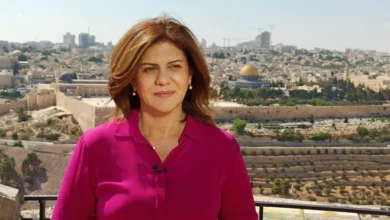Details of the trial of former President Hosni Mubarak, former Interior Minister Habib al-Adly and others on charges related to killing revolution protesters fill some of today’s papers, despite the military council-imposed publishing ban.
During Wednesday’s court session, current Interior Minister Mansour al-Essawy gave evidence in his capacity as a security expert.
Leftist party paper Al-Wafd says that Essawy answered more than 70 questions from defense and victims’ lawyers, responding to half of them by saying, “I don’t know.”
For the first time since the start of the trial, Mubarak commented on witness testimony, according to Al-Wafd, defending himself for two minutes “in a clear and audible voice that bore no trace of his illness.” The paper also reports that Adly commented for 15 minutes on his successor’s testimony.
The closure of Al Jazeera Mubasher Misr’s Cairo office last week is revived by Information Minister Osama Heikal’s claim that the issue “has been blown out of proportion” and that the raid “has nothing to do with the station’s content.”
State-run daily Al-Ahram quotes Heikal as saying that the recent decision to revive enforcement of the Emergency Law was a response to the breach of the Israeli Embassy in Cairo last Friday.
Al-Gomhurriya ruminates on which electoral system Egypt should use for upcoming parliamentary elections, and declares that a mixed system is a “golden opportunity for remnants of the regime and gangs” and that a “list system is dogged by unconstitutionality.”
The state-run daily also runs a three-page special report on Egypt’s Central Security Forces (CSF), or riot police, the body formed in 1969 that Mubarak routinely relied on to quash dissent.
Most CSF soldiers come from Egypt’s poorest areas and many are illiterate, according to the paper.
Former Interior Minister Saad al-Gamal said the CSF “forgot their real role of protecting citizens and stood in the way of demands on behalf of a regime that ran away from a true confrontation of its citizens’ problems.”
In a one-page interview, Assistant Interior Minister for CSF General Salah al-Sherbiny – who was second-in-command during the revolution – maintained that Central Security serves the people despite the interviewer’s insistent questioning about protester deaths at the agency’s hands.
While suggesting that the former regime made “five main mistakes” that led to the revolution, Sherbiny rejected the journalist’s description of CSF as “the National Democratic Party’s armed militia.”
“Interior Ministry senior figures have killed CSF soldiers psychologically a thousand times,” the special report declares.
Ibrahim Eid, a professor of mental health at Ain Shams University, says that training given to CSF troops has damaged them psychologically. This, he says, caused the contradictions inherent in receiving orders to hit, drag and sometimes even kill fellow citizens.
Men serving in the CSF provided descriptions of their lives and roles in the force. One soldier was unable to define what an embassy was, other than a place where visas are issued, and which he has to guard. Another soldier says that if ordered by his commander to use live ammunition against protesters, he would, because his commander understands more and is able to gauge the situation better than he is.
Seven possible presidential candidates held a “secret” meeting on Wednesday at the invitation of some revolutionary youth. Privately owned Al-Shorouk reports that during the meeting the men discussed a roadmap for the remainder of the coming months, including a demand for a transition of power from the military to civilians before the first anniversary of the revolution.
Privately-owned Al-Dostour reports on the National Council for Human Rights’ seemingly vague inquiry into the breach of the Israeli Embassy last week.
The committee, whose members include politician Amr Hamzawy, concluded that members of the Ultras Ahlawy (hardcore football fans) were involved in an “unjustified attack on the Interior Ministry building” and that “infiltrating elements led by unknown persons are instigating incidents in order to bring down the revolution and the state’s authority.”
Egypt's papers:
Al-Ahram: Daily, state-run, largest distribution in Egypt
Al-Akhbar: Daily, state-run, second to Al-Ahram in institutional size
Al-Gomhurriya: Daily, state-run
Rose al-Youssef: Daily, state-run
Al-Dostour: Daily, privately owned
Al-Shorouk: Daily, privately owned
Al-Wafd: Daily, published by the liberal Wafd Party
Youm7: Daily, privately owned
Al-Tahrir: Daily, privately owned
Sawt al-Umma: Weekly, privately owned
Al-Arabi: Weekly, published by the Arab Nasserist party




